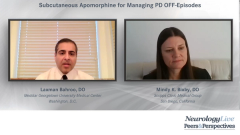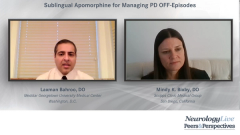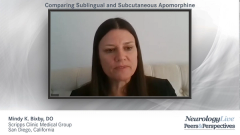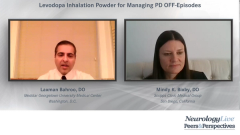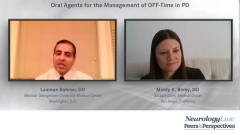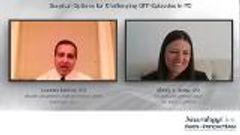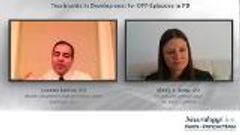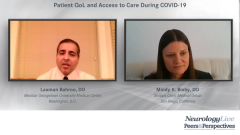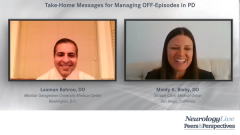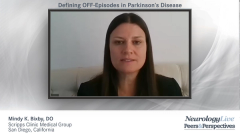
Surgical Options for Challenging OFF Episodes in PD
Laxman Bahroo, DO and Mindy K. Bixby, DO provide insight into factors to consider for patients with challenging off time including surgical and device-assisted therapeutic options.
Episodes in this series

Laxman Bahroo, DO: How do you manage more challenging OFF episode cases?
Mindy K. Bixby, DO: I start with all the opportunities we have. However, if they’re really going OFF a lot, this is always a question for me. If we don’t ever see a true ON, that’s another whole discussion regarding Parkinsonism. However, if you are having many OFF episodes and you tried a lot of these formulations and you’re not doing as well, or you’re having [adverse] effects to some of the medications, that’s when you have to think of other options. If patients are really living life as though every 2 hours, they’re looking at their clock because they’re wondering if they can take their medication. Or, they’re having OFFs and they don’t know when they’re going to have them happen specifically, unfortunately.
You must look at something as a possibly of: We know the dopamine treatment works because they do have Parkinson disease. We’re trying all these other options and they’re not working, we may want to consider something a little bit different. Perhaps, a DBS [deep brain stimulation] possibility. They may be a wonderful deep brain stimulation candidate. The other option is something that’s more long and constant regarding the intestinal gel levodopa, which would be Duopa. There are other opportunities there. If you feel like they’re not happy with ultimately the OFF, ON, OFF, ON, and you can’t seem to get the nice happy bridge that’s comfortable for them, you may want to consider other alternatives like those 2.
Laxman Bahroo, DO: I think that’s true. If you’re seeing folks who are having no ONs, then I think you should think of Parkinsonism or atypical Parkinson disease. However, if individuals are fluctuating and having significant dyskinesias, significant OFFs, or very short duration and you’re not able to manage this with medications, the first thing I tend to think of is, are they compliant with their regimen?
Mindy K. Bixby, DO: Absolutely.
Laxman Bahroo, DO: Or is everything on a PRN [as needed] basis? That can be a challenge. Or are there food interactions? However, once we go beyond that, I agree with you that the 2 options are there. I offered that to a patient just this week. I told her, “These are my 2 options.” I have 2 surgical options. One is DBS, which of course involves neurosurgery and works to reduce the overactivity of the indirect pathway by overstimulating it. Here’s the issue of Duopa, which is a pump. It’s an internal/external device. You have an attached pump. You can modulate your medications far more finely with the pump than you could with oral medications. It’s continuous, you’ve got lots of control. Ultimately, both are surgical options. I think the main limitation is that patients then get to a point of, “Now I know I must get surgery.” One [option] requires [brain] surgery, and the concept of brain surgery scares them a little. And the concept of having a pump inside their body and having an incision has cosmetic issues for them as well, as well as, “Can I maintain this?” This becomes a limiting factor, surgery becomes a point where now the next step they’ve reached is here. Many patients, I’m sure in your practice also, they reach this wall. They know the next option is surgical, but it’s a bridge that they cannot cross.
Mindy K. Bixby, DO: Correct. I’ve been there many times in trying to find a way. A lot of them bring articles upon articles with what may be available in the future that may be able to help them. They want to hold out as long as they can just in case some of the surgical options may cause…and they can receive treatment with this new therapy. We talk about that.
Laxman Bahroo, DO: I completely agree with you. My patients must know your patients.
Mindy K. Bixby, DO: They are very educated and wonderful patients. I think they watch your podcast.
Laxman Bahroo, DO: This is a good point because the limitations are that many people reach a bridge, and they know that there’s an island on the other side and they have to cross this bridge with surgery, but they just can’t bring themselves to do it.
Thank you for watching this NeurologyLive® Peers & Perspectives®. If you enjoyed the content, please subscribe to the e-newsletters to receive upcoming programs and other great content in your inbox.
Transcript Edited for Clarity
Newsletter
Keep your finger on the pulse of neurology—subscribe to NeurologyLive for expert interviews, new data, and breakthrough treatment updates.

